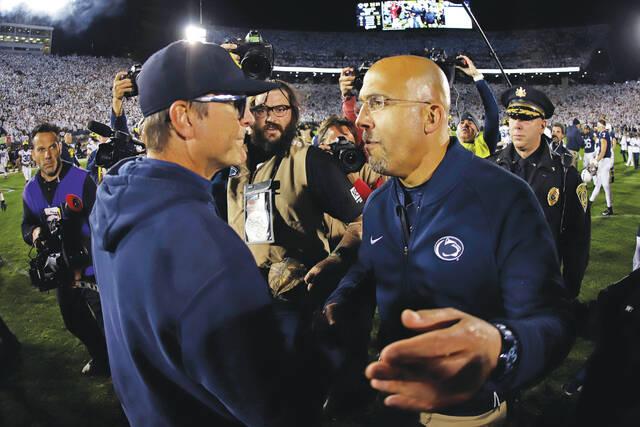Penn State coach James Franklin's non-conference scheduling philosophy aligns with Michigan's approach. Both coaches prioritize giving their teams the best chance at reaching the College Football Playoff. While strength of schedule is considered, having a zero or one in the loss column is crucial. With the Big Ten's expansion and the challenges it brings, Franklin and Michigan counterpart Jim Harbaugh see little reason to add potential stumbling blocks. Let's delve deeper into Franklin's strategic approach to non-conference scheduling.
The Importance of Non-Conference Scheduling
Understanding the significance of non-conference scheduling in college football
Non-conference scheduling plays a crucial role in college football, especially when it comes to teams vying for a spot in the College Football Playoff. Coaches like James Franklin and Jim Harbaugh strategically plan their non-conference schedules to give their teams the best chance at success. While strength of schedule is considered, the ultimate goal is to minimize losses and increase the chances of an undefeated season.
By carefully selecting opponents, teams can control their destiny and increase their chances of making it to the playoffs. Franklin and Harbaugh understand the importance of non-conference scheduling and the impact it can have on their team's playoff aspirations.
Penn State's Non-Threatening Opponents
Exploring Penn State's preference for non-threatening non-conference opponents
Penn State coach James Franklin has shown a preference for scheduling non-threatening opponents in the non-conference portion of the schedule. This approach allows the team to focus on building momentum and confidence early in the season.
Teams like UMass, who will be visiting Beaver Stadium, provide an opportunity for Penn State to fine-tune their strategies and give younger players valuable game experience. While critics may question the strength of these opponents, Franklin's priority is to give his team the best chance at an undefeated season.
Michigan's Non-Conference Scheduling Strategy
Examining Michigan's approach to non-conference scheduling
Michigan coach Jim Harbaugh has faced criticism for the perceived weakness of the team's non-conference schedule. However, Harbaugh's strategy aligns with Franklin's philosophy of minimizing losses and maximizing the chances of reaching the playoffs.
By scheduling opponents that are not considered powerhouses, such as East Carolina, UNLV, and Bowling Green, Michigan aims to build confidence and secure wins early in the season. This approach allows the team to focus on improving and preparing for the challenging Big Ten conference schedule.
The Changing Landscape of College Football
Adapting non-conference scheduling strategies to the evolving college football landscape
The landscape of college football is constantly evolving, with conferences expanding and the competition becoming more challenging. This evolution has led coaches like Franklin and Harbaugh to reevaluate their non-conference scheduling strategies.
With the Big Ten conference adding powerhouse teams like USC, UCLA, Oregon, and Washington in the near future, the need to strategically schedule non-conference opponents becomes even more crucial. Coaches must balance the desire for a strong strength of schedule with the goal of minimizing losses and maximizing playoff chances.
Conclusion
Non-conference scheduling in college football is a strategic decision that coaches like James Franklin and Jim Harbaugh carefully consider. The goal is to give their teams the best chance at reaching the College Football Playoff by minimizing losses and maximizing the chances of an undefeated season. While critics may question the strength of their non-conference opponents, the focus is on building momentum and confidence early in the season. As the college football landscape continues to evolve, coaches must adapt their scheduling strategies to remain competitive.
FQA
Why do coaches prefer non-threatening non-conference opponents?
Coaches prefer non-threatening non-conference opponents to build momentum and confidence early in the season. These opponents provide an opportunity for teams to fine-tune their strategies and give younger players valuable game experience.
What is the goal of non-conference scheduling?
The goal of non-conference scheduling is to minimize losses and maximize the chances of an undefeated season. Coaches prioritize giving their teams the best chance at reaching the College Football Playoff.
Why do some critics question the strength of non-conference opponents?
Critics question the strength of non-conference opponents because they believe that facing tougher competition would better prepare teams for the challenges of conference play. However, coaches like James Franklin and Jim Harbaugh prioritize building confidence and securing wins early in the season.
How does the evolving college football landscape impact non-conference scheduling?
The evolving college football landscape, with conferences expanding and the competition becoming more challenging, requires coaches to adapt their non-conference scheduling strategies. With the addition of powerhouse teams to conferences like the Big Ten, coaches must balance the desire for a strong strength of schedule with the goal of minimizing losses and maximizing playoff chances.

